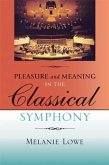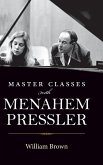Alfred Schnittke
A Schnittke Reader
Alfred Schnittke
A Schnittke Reader
- Gebundenes Buch
- Merkliste
- Auf die Merkliste
- Bewerten Bewerten
- Teilen
- Produkt teilen
- Produkterinnerung
- Produkterinnerung
The volume is rounded out with reflections by some of Schnittke's contemporaries.
Andere Kunden interessierten sich auch für
![Rachmaninoff's Complete Songs Rachmaninoff's Complete Songs]() Richard D SylvesterRachmaninoff's Complete Songs53,99 €
Richard D SylvesterRachmaninoff's Complete Songs53,99 €![Pleasure and Meaning in the Classical Symphony Pleasure and Meaning in the Classical Symphony]() Melanie LowePleasure and Meaning in the Classical Symphony41,99 €
Melanie LowePleasure and Meaning in the Classical Symphony41,99 €![Master Classes with Menahem Pressler Master Classes with Menahem Pressler]() William BrownMaster Classes with Menahem Pressler44,99 €
William BrownMaster Classes with Menahem Pressler44,99 €![The Great American Symphony The Great American Symphony]() Nicholas TawaThe Great American Symphony35,99 €
Nicholas TawaThe Great American Symphony35,99 €![The Bluegrass Reader The Bluegrass Reader]() Thomas GoldsmithThe Bluegrass Reader29,99 €
Thomas GoldsmithThe Bluegrass Reader29,99 €![John Dowland John Dowland]() K Dawn GrapesJohn Dowland168,99 €
K Dawn GrapesJohn Dowland168,99 €![Pete Seeger Reader Pete Seeger Reader]() Pete Seeger Reader73,99 €
Pete Seeger Reader73,99 €-
-
-
The volume is rounded out with reflections by some of Schnittke's contemporaries.
Hinweis: Dieser Artikel kann nur an eine deutsche Lieferadresse ausgeliefert werden.
Hinweis: Dieser Artikel kann nur an eine deutsche Lieferadresse ausgeliefert werden.
Produktdetails
- Produktdetails
- Verlag: Indiana University Press
- Previously announced
- Seitenzahl: 296
- Erscheinungstermin: 16. August 2002
- Englisch
- Abmessung: 265mm x 189mm x 27mm
- Gewicht: 716g
- ISBN-13: 9780253338181
- ISBN-10: 0253338182
- Artikelnr.: 22342573
- Herstellerkennzeichnung
- Libri GmbH
- Europaallee 1
- 36244 Bad Hersfeld
- gpsr@libri.de
- Verlag: Indiana University Press
- Previously announced
- Seitenzahl: 296
- Erscheinungstermin: 16. August 2002
- Englisch
- Abmessung: 265mm x 189mm x 27mm
- Gewicht: 716g
- ISBN-13: 9780253338181
- ISBN-10: 0253338182
- Artikelnr.: 22342573
- Herstellerkennzeichnung
- Libri GmbH
- Europaallee 1
- 36244 Bad Hersfeld
- gpsr@libri.de
Alfred Schnittke was one of the great composers of the twentieth century. Alexander Ivashkin is Professor of Music and Director of the Centre for Russian Music at the University of London. A cellist, he often performs works by Schnittke. Translator John Goodliffe is based in Christchurch, New Zealand.
Preliminary Table of Contents:
Preface by Mstislav Rostropovich
Translator's Note
Schnittke talks about himself
From an interview with Alexander Ivashkin
Letter to the Lenin Prize Committee (1990)
Schnittke on his own compositions
On Concerto Grosso No. 1
On the premiere of his Fourth Symphony
On film and film music
On staging Tchaikovsky's The Queen of Spades
Schnittke on creative artists
Composers
On Shostakovich: circles of influence
On Prokofiev
On Gubaidulina
On Kancheli
In Memory of Filipp Moiseevich Gershkovich (Philip Hershkovish)
Peformers
On Svyatoslav Richter
On Gennady Rozhdestvensky
Subjective Notes on an Objective Performance (on Aleksey Lyubimov)
A Writer
On Viktor Yerofeev
A Painter
On the Paintings of Vladimir Yankilevsky
V. Schnittke on twentieth-century music
1. Polystylistic tendencies in modern music
2. The orchestra and "the new music"
3. The problem of giving outward expression to a new idea
4. From Schnittke's archive
5. On jazz
6. Timbral relationships and their functional use: the timbral scale
7. "Klangfarbenmelodie"-"Melody of timbres"
8. Functional instability of voice-leading in musical texture
9. A new approach to composition: the statistical method
10. Stereophonic tendencies in modern orchestral thinking
11. Using rhythm to overcome metre
12. Static form: a new conception of time
13. Paradox as a feature of Stravinsky's musical logic
14. Timbre modulations in Bartók's Music for Strings, Percussion, and
Celesta
15. The closed system of timbre connections in the Bach-Webern Ricercata
fugue
16. The third movement of Luciano Berio's Symphony
17. Orchestral micropolyphony in the music of Ligeti
VI. Schnittke as seen by others
Gidon Kremer
Gennady Rozhdestvensky
Vladimir Yankilevsky
Mstislav Rostropovich
Mark Lubotsky
Sources
Index of names and works
Preface by Mstislav Rostropovich
Translator's Note
Schnittke talks about himself
From an interview with Alexander Ivashkin
Letter to the Lenin Prize Committee (1990)
Schnittke on his own compositions
On Concerto Grosso No. 1
On the premiere of his Fourth Symphony
On film and film music
On staging Tchaikovsky's The Queen of Spades
Schnittke on creative artists
Composers
On Shostakovich: circles of influence
On Prokofiev
On Gubaidulina
On Kancheli
In Memory of Filipp Moiseevich Gershkovich (Philip Hershkovish)
Peformers
On Svyatoslav Richter
On Gennady Rozhdestvensky
Subjective Notes on an Objective Performance (on Aleksey Lyubimov)
A Writer
On Viktor Yerofeev
A Painter
On the Paintings of Vladimir Yankilevsky
V. Schnittke on twentieth-century music
1. Polystylistic tendencies in modern music
2. The orchestra and "the new music"
3. The problem of giving outward expression to a new idea
4. From Schnittke's archive
5. On jazz
6. Timbral relationships and their functional use: the timbral scale
7. "Klangfarbenmelodie"-"Melody of timbres"
8. Functional instability of voice-leading in musical texture
9. A new approach to composition: the statistical method
10. Stereophonic tendencies in modern orchestral thinking
11. Using rhythm to overcome metre
12. Static form: a new conception of time
13. Paradox as a feature of Stravinsky's musical logic
14. Timbre modulations in Bartók's Music for Strings, Percussion, and
Celesta
15. The closed system of timbre connections in the Bach-Webern Ricercata
fugue
16. The third movement of Luciano Berio's Symphony
17. Orchestral micropolyphony in the music of Ligeti
VI. Schnittke as seen by others
Gidon Kremer
Gennady Rozhdestvensky
Vladimir Yankilevsky
Mstislav Rostropovich
Mark Lubotsky
Sources
Index of names and works
Preliminary Table of Contents:
Preface by Mstislav Rostropovich
Translator's Note
Schnittke talks about himself
From an interview with Alexander Ivashkin
Letter to the Lenin Prize Committee (1990)
Schnittke on his own compositions
On Concerto Grosso No. 1
On the premiere of his Fourth Symphony
On film and film music
On staging Tchaikovsky's The Queen of Spades
Schnittke on creative artists
Composers
On Shostakovich: circles of influence
On Prokofiev
On Gubaidulina
On Kancheli
In Memory of Filipp Moiseevich Gershkovich (Philip Hershkovish)
Peformers
On Svyatoslav Richter
On Gennady Rozhdestvensky
Subjective Notes on an Objective Performance (on Aleksey Lyubimov)
A Writer
On Viktor Yerofeev
A Painter
On the Paintings of Vladimir Yankilevsky
V. Schnittke on twentieth-century music
1. Polystylistic tendencies in modern music
2. The orchestra and "the new music"
3. The problem of giving outward expression to a new idea
4. From Schnittke's archive
5. On jazz
6. Timbral relationships and their functional use: the timbral scale
7. "Klangfarbenmelodie"-"Melody of timbres"
8. Functional instability of voice-leading in musical texture
9. A new approach to composition: the statistical method
10. Stereophonic tendencies in modern orchestral thinking
11. Using rhythm to overcome metre
12. Static form: a new conception of time
13. Paradox as a feature of Stravinsky's musical logic
14. Timbre modulations in Bartók's Music for Strings, Percussion, and
Celesta
15. The closed system of timbre connections in the Bach-Webern Ricercata
fugue
16. The third movement of Luciano Berio's Symphony
17. Orchestral micropolyphony in the music of Ligeti
VI. Schnittke as seen by others
Gidon Kremer
Gennady Rozhdestvensky
Vladimir Yankilevsky
Mstislav Rostropovich
Mark Lubotsky
Sources
Index of names and works
Preface by Mstislav Rostropovich
Translator's Note
Schnittke talks about himself
From an interview with Alexander Ivashkin
Letter to the Lenin Prize Committee (1990)
Schnittke on his own compositions
On Concerto Grosso No. 1
On the premiere of his Fourth Symphony
On film and film music
On staging Tchaikovsky's The Queen of Spades
Schnittke on creative artists
Composers
On Shostakovich: circles of influence
On Prokofiev
On Gubaidulina
On Kancheli
In Memory of Filipp Moiseevich Gershkovich (Philip Hershkovish)
Peformers
On Svyatoslav Richter
On Gennady Rozhdestvensky
Subjective Notes on an Objective Performance (on Aleksey Lyubimov)
A Writer
On Viktor Yerofeev
A Painter
On the Paintings of Vladimir Yankilevsky
V. Schnittke on twentieth-century music
1. Polystylistic tendencies in modern music
2. The orchestra and "the new music"
3. The problem of giving outward expression to a new idea
4. From Schnittke's archive
5. On jazz
6. Timbral relationships and their functional use: the timbral scale
7. "Klangfarbenmelodie"-"Melody of timbres"
8. Functional instability of voice-leading in musical texture
9. A new approach to composition: the statistical method
10. Stereophonic tendencies in modern orchestral thinking
11. Using rhythm to overcome metre
12. Static form: a new conception of time
13. Paradox as a feature of Stravinsky's musical logic
14. Timbre modulations in Bartók's Music for Strings, Percussion, and
Celesta
15. The closed system of timbre connections in the Bach-Webern Ricercata
fugue
16. The third movement of Luciano Berio's Symphony
17. Orchestral micropolyphony in the music of Ligeti
VI. Schnittke as seen by others
Gidon Kremer
Gennady Rozhdestvensky
Vladimir Yankilevsky
Mstislav Rostropovich
Mark Lubotsky
Sources
Index of names and works








